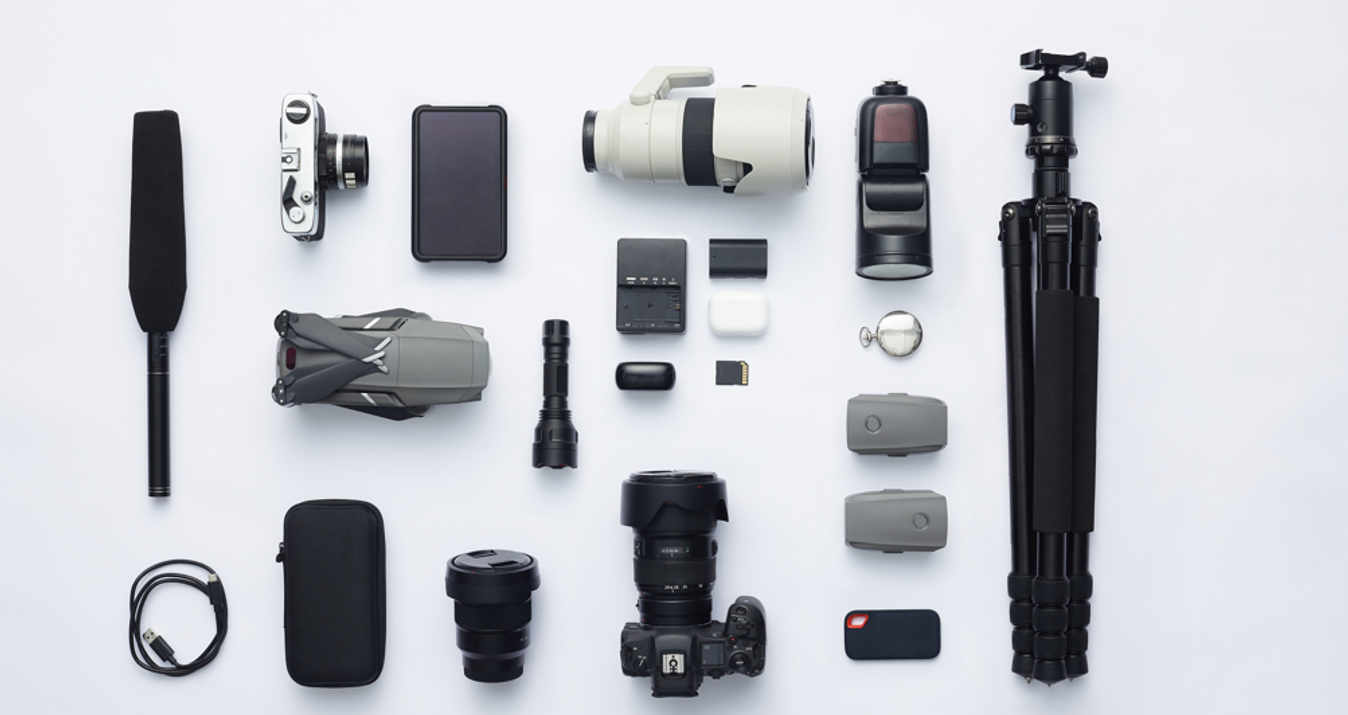Adobe Photoshop Review: Must-Read Before You Decide
Last Updated on October 14, 2025
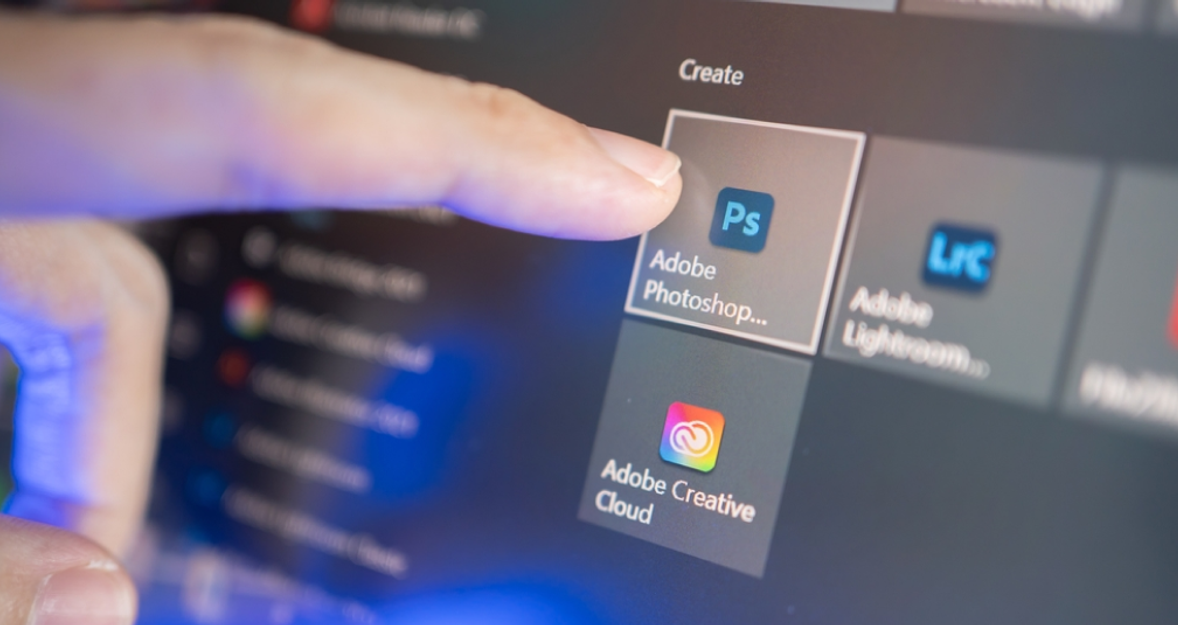
Read our Adobe Photoshop review to see if it’s worth it. Discover key features, pros and cons, and how beginners can master powerful photo editing tools.
When people say “photo editing app”, I associate it with Adobe Photoshop. It's the most renowned and feature-packed application, recognized for its tough editing capabilities. It includes all that a photographer requires.
For beginners, the main Adobe Photoshop interface can seem somewhat challenging initially. Once you learn how to utilize it, you will possess a strong tool for modifying your pictures. This Photoshop review is designed to assist you with that.
Core Features of Adobe Photoshop
You could also try Adobe Photoshop Elements, which is a simplified version of Adobe Photoshop. Twice a week, I used Luminar Neo for retouching materials after photo sessions. That app is even more suitable for beginners than “Elements”.
Photoshop offers a wide range of features for editing your photos and images. Its core features include:
image retouching and restoration;
layer-based editing;
creative filters and effects;
masking and selection tools;
color correction;
adding text;
plugin support.
We will explore each of these features in more detail.
Your AI-Powered Photo Editor for MacOS and Windows
Discover Now!Advanced Image Retouching and Restoration
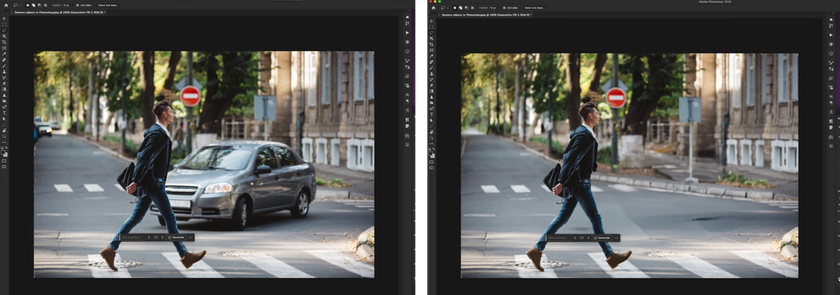 It allows you to remove unwanted objects, make a picture more contrasty and clear, and improve its edges.
It allows you to remove unwanted objects, make a picture more contrasty and clear, and improve its edges.
An example is when working with a portrait, you are able to make the person look better by removing wrinkles and blemishes or even out the skin. This can be done using a number of tools (such as the crop tool). In order to delete a minor object, you simply pick the respective layer on the Layers panel. Further, you select the Spot Healing Brush Tool via the Tools panel. A majority of the tools that are commonly used are available there.
It is more complicated to remove bigger objects. You begin with the required layer, like dealing with minute objects. Thereafter, you use the menu bar and use the option of Edit, Fill, and then use Content-Aware. It is also a valuable feature for restoring old photographs. All that needs to be done is to add an old photo and go through the filters to get options such as neutral color filters and restoration tools. The application can automatically exclude the scratches and make a faded photograph more contrasted, clear, and deep.
It was hard to resist restoring several photos of our family from my grandmother's album with this feature. They were already quite damaged and faded, but they had a chance of being restored. A few YouTube videos and some keyboard shortcuts did the trick — if you like vintage aesthetics, you should definitely try photo restoration. Plus, there is a free Photoshop alternative that is also suitable for this kind of work.
Layer-Based Editing for Precision
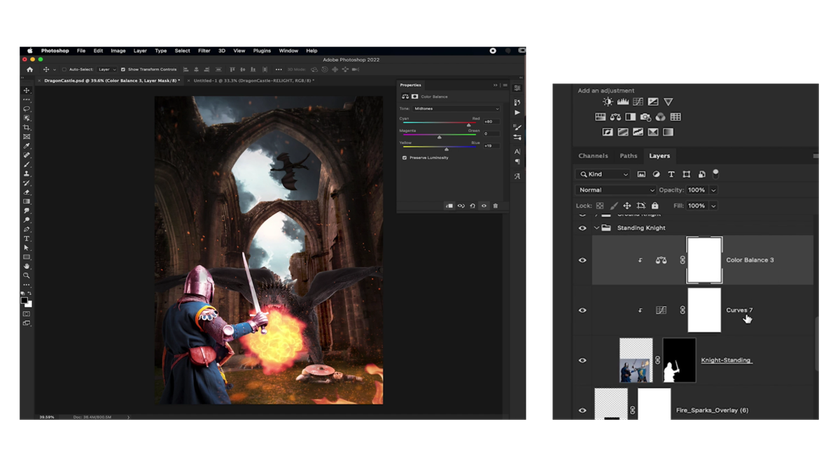 My favorite feature in Adobe Photoshop is layer-based editing. While not unique to this program, it is incredibly convenient and is used in many others.
My favorite feature in Adobe Photoshop is layer-based editing. While not unique to this program, it is incredibly convenient and is used in many others.
You can select a single layer, for example, the background, and edit only that specific part. The rest of the image remains unchanged. This allows you to modify every detail independently, resulting in cleaner and more professional-looking images. For layer-based editing, Photoshop provides a dedicated Layers panel, which I mentioned earlier when we discussed image retouching.
Creative Filters and Effects
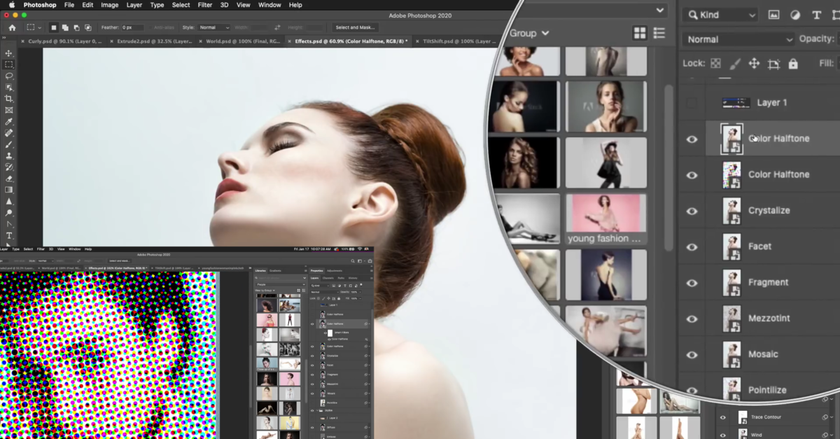 I have always considered myself to be a fairly creative person, so filters and effects are right up my alley. They can give a photo a whole new artistic look: you can make a photo look like a watercolor painting, a classic fresco, or even give it a neon glow. I played around with a few of them on the same portrait, and you can see the results.
I have always considered myself to be a fairly creative person, so filters and effects are right up my alley. They can give a photo a whole new artistic look: you can make a photo look like a watercolor painting, a classic fresco, or even give it a neon glow. I played around with a few of them on the same portrait, and you can see the results.
There's a whole range of these creative filters to choose from, like:
Watercolor (This one is my personal favorite);
Colored Pencils;
Cutout (It makes the image look like it was put together from rough pieces of colored paper);
Dry Brush;
Fresco (This is another one of my top picks);
Film Grain (Adds those classic, gritty grain patterns);
Neon Glow;
Paint Daubs;
Plastic Wrap;
Palette Knife;
Poster Edges;
Smudge Stick;
Sponge;
Underpainting.
Each of them has its own characteristics, and you shouldn't adjust all photos to just one style. Even if it's one photo shoot, experiment — add neon glow, black and white filter, “pencil drawing.” Try to stick to a similar style, but that doesn't mean choosing just one or two filters.
Powerful Selection Tools and Masking
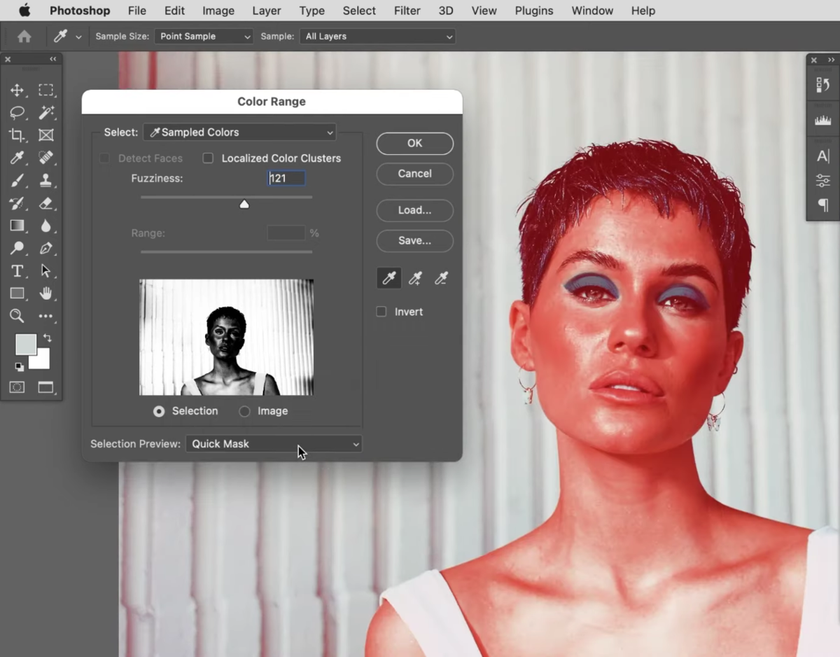 In the 2020 version, Adobe introduced a really handy object selection tool. It allows you to select objects in a photo with a single click. You also have access to all the standard selection tools, including the Lasso, Brush, Hand, and Zoom.
In the 2020 version, Adobe introduced a really handy object selection tool. It allows you to select objects in a photo with a single click. You also have access to all the standard selection tools, including the Lasso, Brush, Hand, and Zoom.
I would especially like to mention the Refine Edge tool. This is also a relatively new feature that has radically changed the process of cleaning up the edges of selected objects, giving them an extremely natural look. I tried this tool, and you won't believe how convenient it is. Try it yourself and see the results.
Color Correction and Adjustment Capabilities
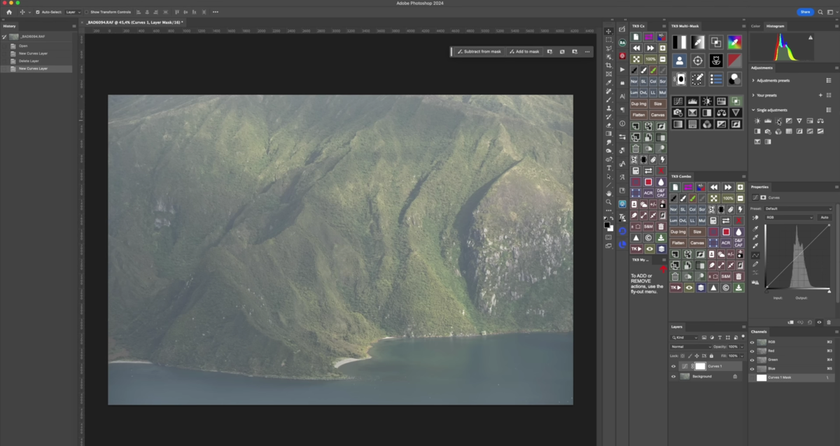 When it comes to editing colors and contrast, Photoshop gives you two main ways to go about it: Layers and Adobe Camera Raw.
When it comes to editing colors and contrast, Photoshop gives you two main ways to go about it: Layers and Adobe Camera Raw.
Use Layers when you need to tweak just one specific part of an image. But if you want to adjust the overall contrast or color depth of the entire picture, then Adobe Camera Raw is your best bet. A little spoiler: you'll probably find yourself using both options all the time.
Text and Graphic Manipulation Tools
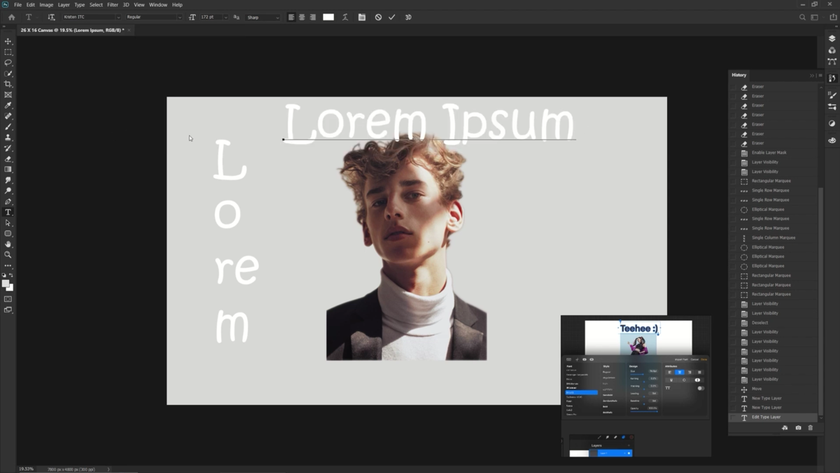 For adding and editing text, Photoshop offers the Type Tool and an Options Bar. The Type Tool lets you add and select text, while the Options Bar lets you adjust its size, color, alignment, and more. Don't limit your imagination — add text vertically, in a circle, in a rainbow, diagonally, in the shape of an object (as an idea for a logo), on the background of an image, overlapping something.
For adding and editing text, Photoshop offers the Type Tool and an Options Bar. The Type Tool lets you add and select text, while the Options Bar lets you adjust its size, color, alignment, and more. Don't limit your imagination — add text vertically, in a circle, in a rainbow, diagonally, in the shape of an object (as an idea for a logo), on the background of an image, overlapping something.
Extensive Plugin Support for Versatility
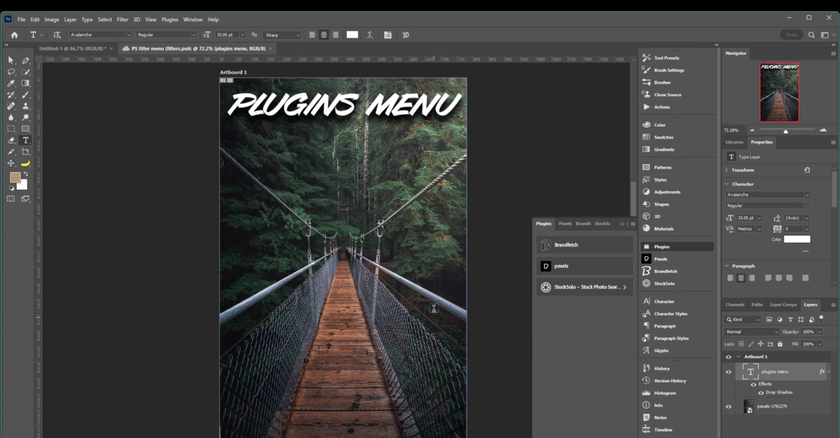 Another great feature of Photoshop is its huge ecosystem of free Adobe Photoshop plugins. Here are a few of my favorites: Imagine Creator and Fontself.
Another great feature of Photoshop is its huge ecosystem of free Adobe Photoshop plugins. Here are a few of my favorites: Imagine Creator and Fontself.
The first one uses artificial intelligence to generate images. You just enter a description, and it creates an image for you. The second is great for converting your handwritten letters into a digital font that you can use.
Is there a really good plugin for Ps? Yes, there are several versions of this application, and one of them is the Luminar Neo plugin for Photoshop. Here are some other powerful plugins: Nik Collection, Topaz Gigapixel AI, and Imagenomic Portraiture.
New Features in Adobe Photoshop
Adobe Photoshop 2025 does not have a single release date, but is a series of updates released throughout 2025: version 26.8 was released in June, version 26.9 in July, and version 26.10 in August 2025. The developers have packed it with a bunch of amazing new AI-powered tools.
Generative AI: Fill and Expand Tools
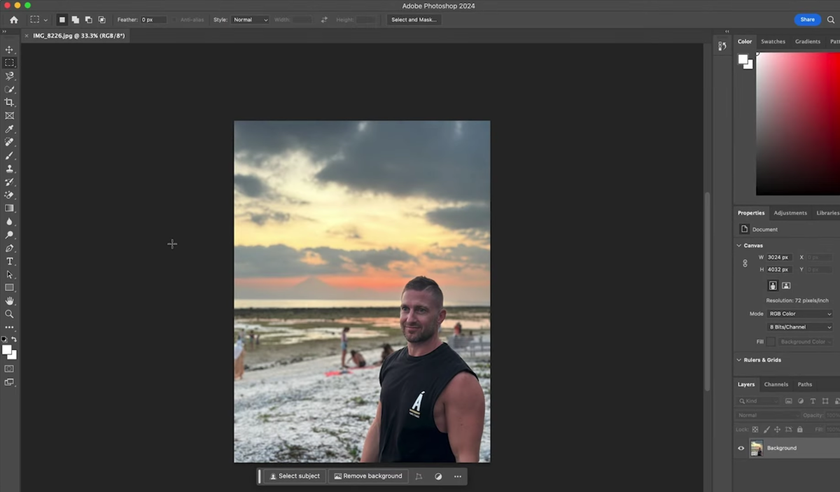 These tools make it easy to remove unwanted objects and even enlarge photos. For example, I had a great photo of a cityscape, but a few annoying power lines were spoiling the view. To fix this, I simply used the Generative Fill tool to remove them — it was incredibly easy.
These tools make it easy to remove unwanted objects and even enlarge photos. For example, I had a great photo of a cityscape, but a few annoying power lines were spoiling the view. To fix this, I simply used the Generative Fill tool to remove them — it was incredibly easy.
When I want to create a completely unique look, I use Generative Fill to change the background. And if a photo seems too cramped, Generative Expand helps me enlarge the canvas and intelligently adds new details to fill the space.
Neural Filters: Enhancing Editing with AI
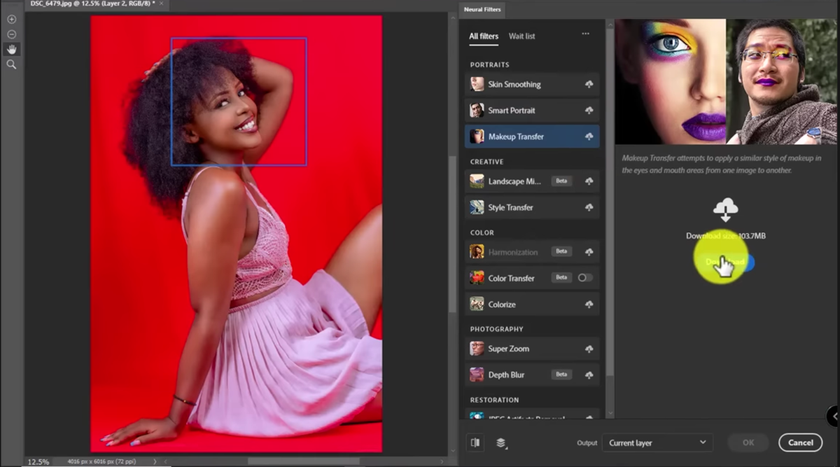 They are the best filters to use when polishing portraits and landscapes. The Neural Filters are able to accomplish such tasks as colorizing a black-and-white photograph, adding digital makeup, or toning down skin, and blurring pictures. Their other use is that they are great at evening the skin tone and eliminating small spots like pimples, wrinkles, and redness.
They are the best filters to use when polishing portraits and landscapes. The Neural Filters are able to accomplish such tasks as colorizing a black-and-white photograph, adding digital makeup, or toning down skin, and blurring pictures. Their other use is that they are great at evening the skin tone and eliminating small spots like pimples, wrinkles, and redness.
Adobe Firefly: Generative AI for Creativity
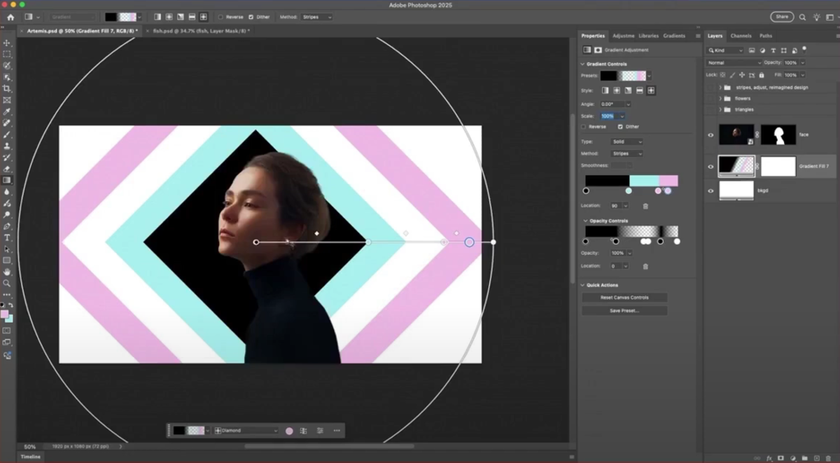 Then there is Adobe Firefly, which is a comparatively new AI tool designed with creators in mind. This web application will be able to produce the images of a plain description and even produce videos of two or more pictures. You also have an option of a variety of styles and designs.
Then there is Adobe Firefly, which is a comparatively new AI tool designed with creators in mind. This web application will be able to produce the images of a plain description and even produce videos of two or more pictures. You also have an option of a variety of styles and designs.
But my favorite part? You can use it for free. Naturally, the free version is not fully functional, but it will be ideal to get the feel of the water, to determine whether you like the tool, whether you need it in the first place, and whether the interface is user-friendly to you.
Camera Raw Enhancements for Professional Edits
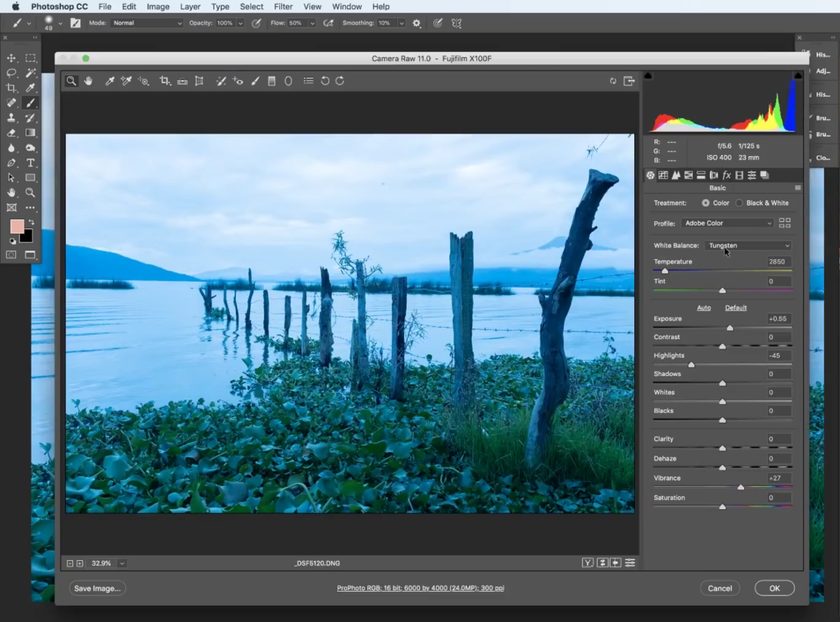 This program is suitable for non-destructive editing. And when you need to make some edits to a photograph, but you want it to look natural. Adobe Camera Raw is helpful in solving such typical issues as blurriness, overexposure (excessive light), or too dense shadows.
This program is suitable for non-destructive editing. And when you need to make some edits to a photograph, but you want it to look natural. Adobe Camera Raw is helpful in solving such typical issues as blurriness, overexposure (excessive light), or too dense shadows.
It does this automatically by balancing the contrast and brightness to make your picture look more professional and polished without being too extreme, and it can be adjusted with a single click.
Object Selection and Remove Tool
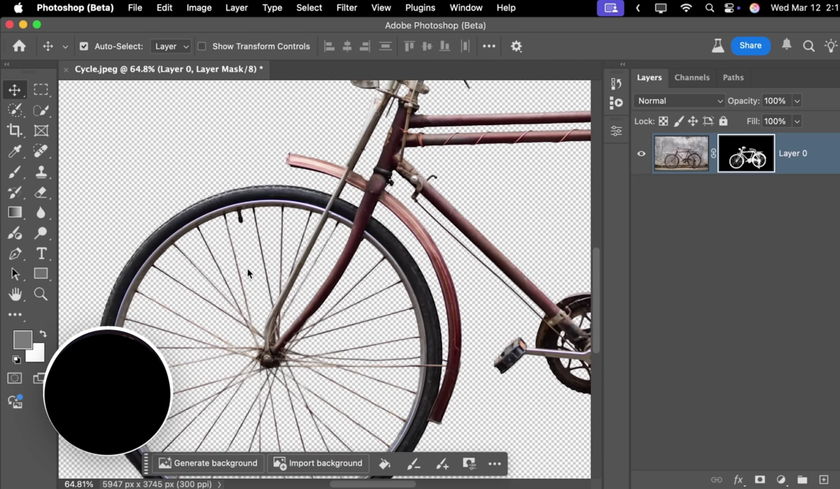 The Object Selection Tool identifies and selects specific objects in an image, and the Remove Tool utilizes AI to delete the selected objects and replace the area with a background. They can be combined by first clicking on an object using the Object Selection Tool, and then clicking on it again using the Remove Tool to remove the object, or by simply clicking on an object using the Remove Tool and brushing over it with the tool in the shortest possible time.
The Object Selection Tool identifies and selects specific objects in an image, and the Remove Tool utilizes AI to delete the selected objects and replace the area with a background. They can be combined by first clicking on an object using the Object Selection Tool, and then clicking on it again using the Remove Tool to remove the object, or by simply clicking on an object using the Remove Tool and brushing over it with the tool in the shortest possible time.
Adobe Photoshop for Photographers — Review Products
Photoshop is your true friend, whether you are new to photography or an old hand. You can be proficient in various programs, but to work in any field associated with photography, retouching, or design, you will need to know Photoshop.
Sky Replacement and Advanced Retouching
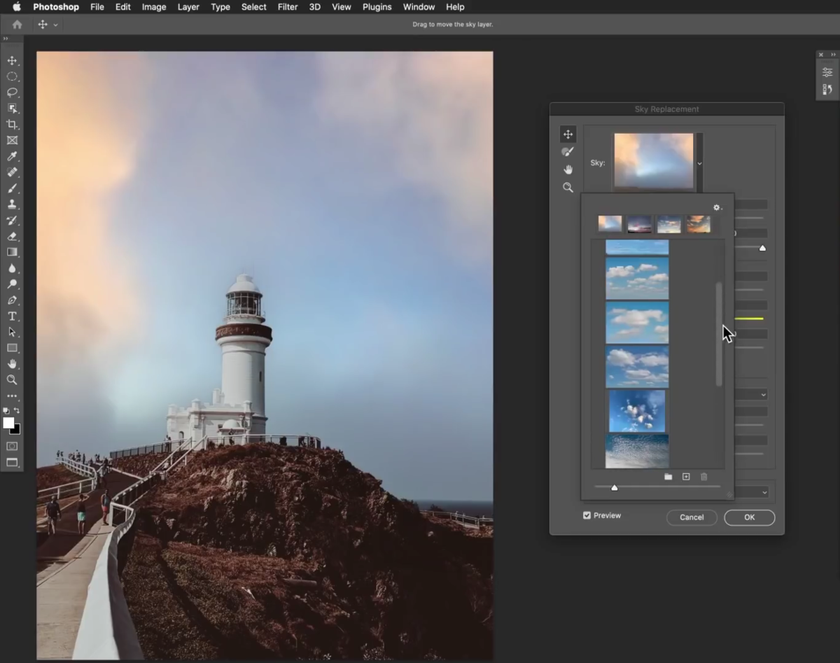 The two features of AI enable the easy swapping of the sky in a photograph and the reshaping of the horizon into something truly remarkable. Any sky background can be imagined, located in the collection, and put on a special layer. Photoshop offers a collection of sky images categorized into three groups: Blue Sky, Spectacular, and Sunset. Any of these suggestions can be tried, or free sky templates, which are tornadoes, fireworks, and stars, can be downloaded by professional photographers.
The two features of AI enable the easy swapping of the sky in a photograph and the reshaping of the horizon into something truly remarkable. Any sky background can be imagined, located in the collection, and put on a special layer. Photoshop offers a collection of sky images categorized into three groups: Blue Sky, Spectacular, and Sunset. Any of these suggestions can be tried, or free sky templates, which are tornadoes, fireworks, and stars, can be downloaded by professional photographers.
Advanced retouching is featured on Adobe Photoshop with the capability to correct defects (spot healing brush, stamp), skin (blur, opacity), color, and new generative AI (generative fill) capabilities, which enable you to fix images with utmost accuracy and control over each pixel.
Content-Aware Fill and Liquify
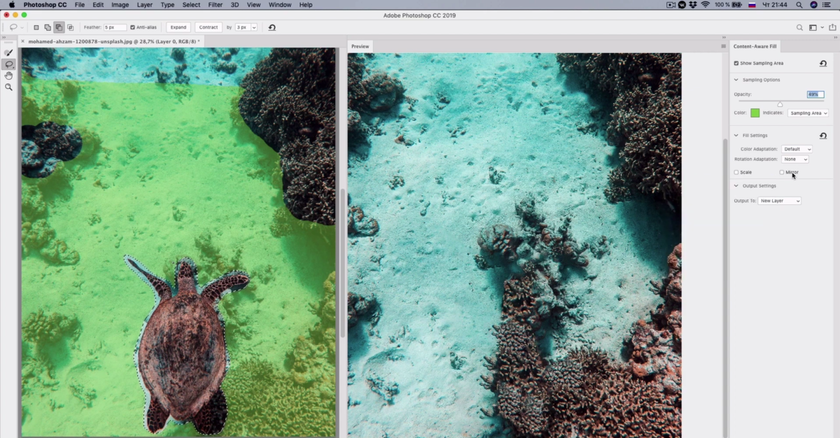 The difference between it and the Object Selection Tool is that it smoothly fills the chosen area by sampling the background. It is only a matter of choosing the object and then pressing delete, and the software automatically fills up the area.
The difference between it and the Object Selection Tool is that it smoothly fills the chosen area by sampling the background. It is only a matter of choosing the object and then pressing delete, and the software automatically fills up the area.
And then there's Liquify. It allows you to bend the form of objects — you can squash, stretch, and bend elements. The Liquify tool is the type of tool you would want to use if the dream-like distortions have ever inspired you in the paintings of Dali.
Noise Reduction for Cleaner Photos
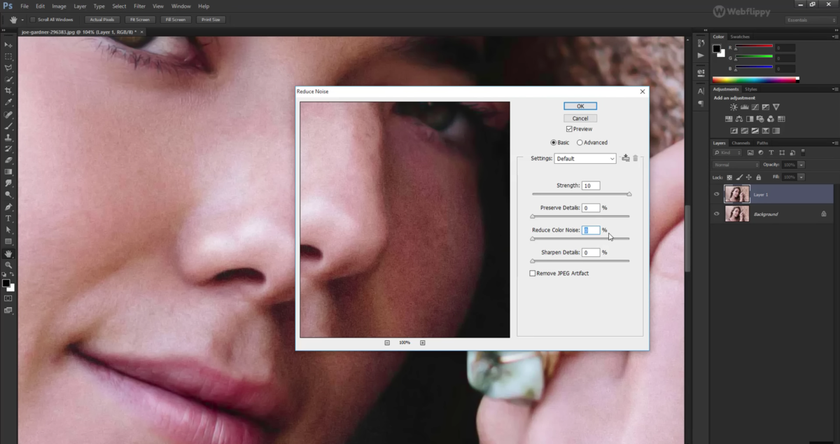 Grainy pixels — distraction is typically caused by using low-light settings or low-quality equipment, although it may also happen in high-end cameras. There is a Photoshop tool to remove it. The simplest method of reducing it is to click on Filter, Noise, and Reduce Noise. It allows cleaning a picture in a few clicks, and the picture appears much smoother.
Grainy pixels — distraction is typically caused by using low-light settings or low-quality equipment, although it may also happen in high-end cameras. There is a Photoshop tool to remove it. The simplest method of reducing it is to click on Filter, Noise, and Reduce Noise. It allows cleaning a picture in a few clicks, and the picture appears much smoother.
Camera Raw for Professional Adjustments
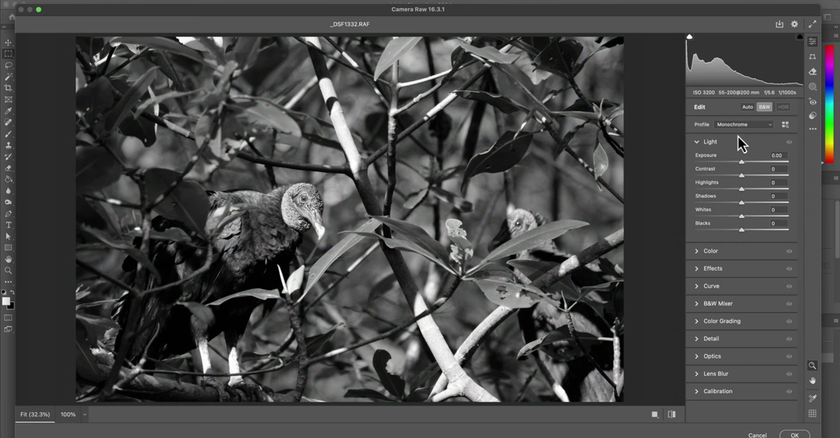 The ideal option is Camera Raw, which is designed for photographers who want their photographs to appear natural and as close to the original image as possible. It helps you achieve a smooth, professional look with minimal effort, which is ideal for enhancing an image without excessive processing.
The ideal option is Camera Raw, which is designed for photographers who want their photographs to appear natural and as close to the original image as possible. It helps you achieve a smooth, professional look with minimal effort, which is ideal for enhancing an image without excessive processing.
Adobe Photoshop for Artists and Designers
If you read most Adobe Photoshop reviews, this app is a complete creative workstation for illustration, branding, layout, and concept art. In a single place, you have accurate brushes, tight typography, non-destructive compositing, and AI-assisted tools, so sketches, mockups, and production assets exist within a single controllable pipeline.
Advanced Brushes and Pencils
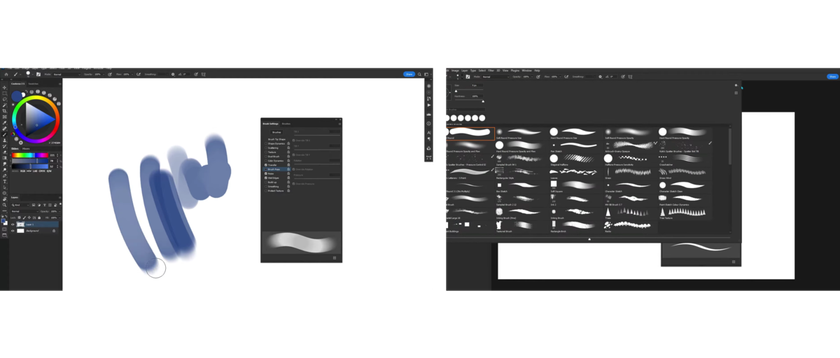 Photoshop’s brush engine is built for control, not just presets. Tune shape dynamics, scattering, texture, dual-brush blends, color dynamics, transfer, and smoothing; map tilt/pressure curves to stylus input for line weight you can repeat across pages. The Mixer Brush handles wet blends and glaze-style layering, while symmetry and stroke smoothing clean up inking. Add Kyle Webster sets or convert scanned marks into custom tips, then save tool presets for consistent results.
Photoshop’s brush engine is built for control, not just presets. Tune shape dynamics, scattering, texture, dual-brush blends, color dynamics, transfer, and smoothing; map tilt/pressure curves to stylus input for line weight you can repeat across pages. The Mixer Brush handles wet blends and glaze-style layering, while symmetry and stroke smoothing clean up inking. Add Kyle Webster sets or convert scanned marks into custom tips, then save tool presets for consistent results.
Turbocharged Gradients and Adjustment Brushes
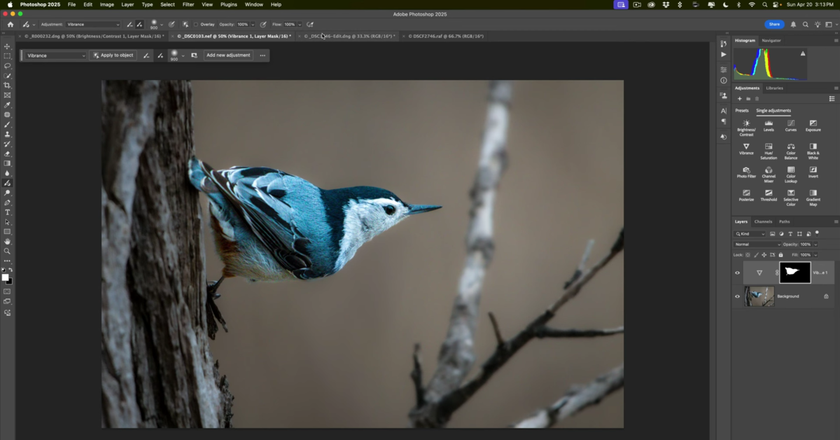 Gradients are fully editable: use Gradient Fill layers for on-canvas angle/scale/opacity, or Gradient Map to remap luminance into a precise palette. Local adjustments happen via masks — paint Curves, Hue/Saturation, Selective Color, and Color Balance exactly where needed instead of baking edits into pixels. For targeted polish, combine Dodge & Burn on 50% gray layers with soft brushes to shape light without banding.
Gradients are fully editable: use Gradient Fill layers for on-canvas angle/scale/opacity, or Gradient Map to remap luminance into a precise palette. Local adjustments happen via masks — paint Curves, Hue/Saturation, Selective Color, and Color Balance exactly where needed instead of baking edits into pixels. For targeted polish, combine Dodge & Burn on 50% gray layers with soft brushes to shape light without banding.
Typography and Font Manipulation
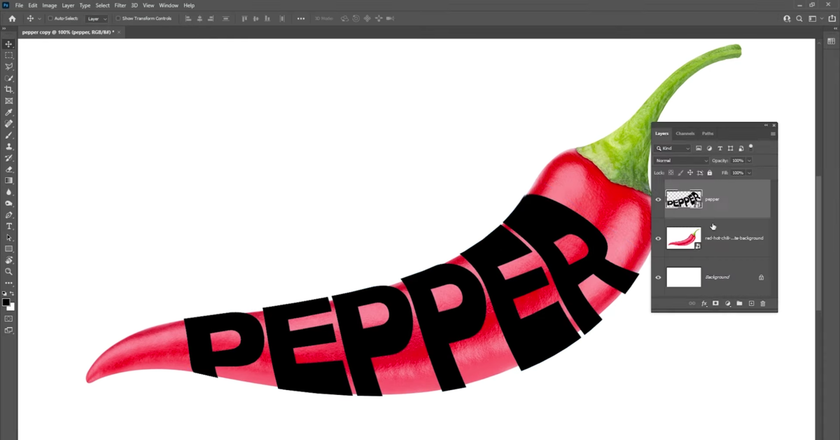 Type tools cover production needs: kerning, tracking, leading, baseline shift, optical/metric spacing, and OpenType features (ligatures, small caps, stylistic sets). Variable fonts allow weight/width tweaks without swapping families; type on a path and live warps handle non-rectilinear layouts. Keep vectors live with Smart Objects, use grids and art boards for multi-size deliverables, and export crisp assets as SVG/PDF while preserving hinting.
Type tools cover production needs: kerning, tracking, leading, baseline shift, optical/metric spacing, and OpenType features (ligatures, small caps, stylistic sets). Variable fonts allow weight/width tweaks without swapping families; type on a path and live warps handle non-rectilinear layouts. Keep vectors live with Smart Objects, use grids and art boards for multi-size deliverables, and export crisp assets as SVG/PDF while preserving hinting.
3D and Graphic Design Capabilities
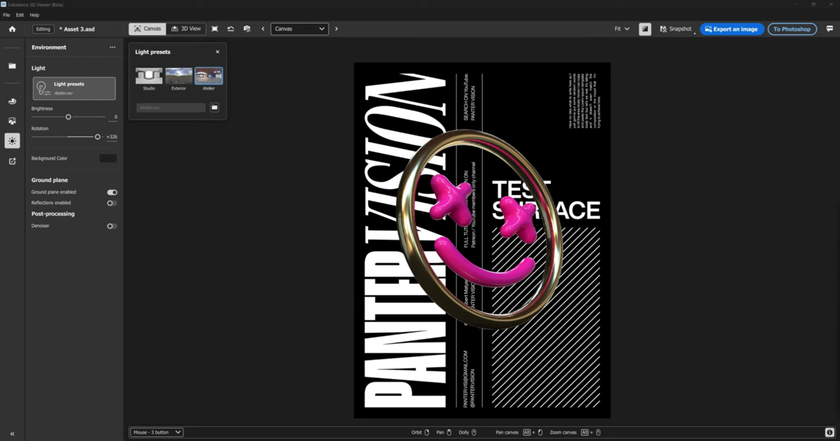 Photoshop’s legacy 3D workspace is deprecated in current builds; for true modelling/texturing, use Adobe Substance apps. In Photoshop, composite rendered passes, fake depth with Lens Blur and depth maps, build shadows with gradients and Multiply layers, and align elements using Perspective Warp/Vanishing Point. For graphic design, Pen/Shape tools provide clean vectors with boolean ops, Layer Styles deliver repeatable brand accents, Libraries centralise colours/logos, and Layer Comps track layout states for fast revisions.
Photoshop’s legacy 3D workspace is deprecated in current builds; for true modelling/texturing, use Adobe Substance apps. In Photoshop, composite rendered passes, fake depth with Lens Blur and depth maps, build shadows with gradients and Multiply layers, and align elements using Perspective Warp/Vanishing Point. For graphic design, Pen/Shape tools provide clean vectors with boolean ops, Layer Styles deliver repeatable brand accents, Libraries centralise colours/logos, and Layer Comps track layout states for fast revisions.
Adobe Photoshop Pricing and Subscription Options
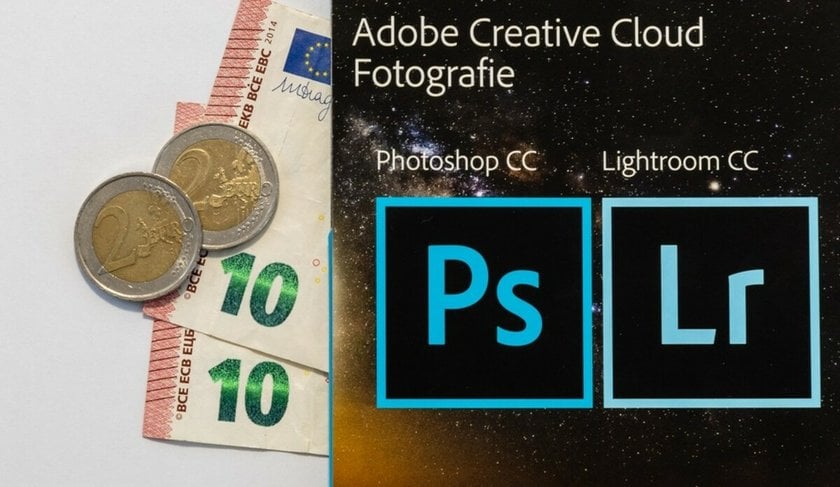 Some tools, like Firefly and certain brushes and pencils, are available for free. Other features require a subscription. My advice is to first try the free tools in Adobe Photoshop to see if you're satisfied with the app.
Some tools, like Firefly and certain brushes and pencils, are available for free. Other features require a subscription. My advice is to first try the free tools in Adobe Photoshop to see if you're satisfied with the app.
Photoshop as Part of Adobe Creative Cloud
I use Creative Cloud because everything connects: Photoshop on desktop, web, and mobile, plus cloud storage, fonts, and generative tools. The main individual plans I work with are Photoshop (Single App) with 100 GB storage, the Photography plan with Photoshop + Lightroom and 1 TB, and All Apps with 20+ creative tools and 100 GB.
My subscription also includes Adobe Fonts, access to generative AI via Firefly credits, and Adobe Express Premium, which is bundled in my region. In practice, I open a file on the laptop, tweak it in the browser, and polish on the iPad — all under one account.
Photoshop Standalone Pricing vs. Subscription Model
There isn’t a perpetual “standalone” license for full Photoshop anymore — it’s a subscription. I choose based on workload:
Photography plan when I need Photoshop + Lightroom and larger storage (1 TB).
Photoshop (Single App) when I only need Photoshop (100 GB).
All Apps are used when a project requires the broader CC toolbox.
Generative features run on Firefly credits (the monthly amount depends on the plan). Photoshop on iPad is included with my subscription, and I also have access to the web version. Exact bundles and mobile extras can vary by purchase channel and region, so I always check the plan page before upgrading.
Cancellation policy. On an annual plan (paid monthly), I can cancel within the first 14 days for a full refund. After that, there’s typically a fee (approximately 50% of the remaining commitment). For prepaid annual plans, refunds generally aren’t offered after 14 days. I keep that in mind before switching tiers.
Is Adobe Photoshop Worth the Cost?
For my work, yes — I get full compositing, consistent font licensing, shared libraries, and generative tools in one ecosystem. If I’m shooting or designing occasionally, I stick to Single App or Photography.
If I’m building multi-format campaigns, I go All Apps. Before paying, I double-check five things: included storage, whether Adobe Fonts/Express are part of the plan, my monthly Firefly credits, access across desktop/web/mobile (including iPad), and the cancellation terms. That’s how I match the subscription to the project without overpaying.
Pros and Cons of Adobe Photoshop
 Photoshop sits at the crossroads of pixel craft, typography, and asset delivery. Before choosing it, decide what you need most with Photoshop reviews — repeatable retouching, brand-tight visuals, or deep compositing — and how those needs fit your budget and hardware.
Photoshop sits at the crossroads of pixel craft, typography, and asset delivery. Before choosing it, decide what you need most with Photoshop reviews — repeatable retouching, brand-tight visuals, or deep compositing — and how those needs fit your budget and hardware.
Clarify your must-haves (layers, masks, fonts, AI tools), your handoff targets (print, web, video), and the pace you’re expected to keep. With that baseline, you’ll know whether the app is your daily driver or a specialist you call in for the hard shots.
Aspect | What it means | Who benefits / impact | Tips/mitigation |
Industry-leading editing tools | Deep raster editing, masking, Smart Objects/Filters, advanced retouch, and compositing. | Pros who need pixel-level control for branding, retouching, and composites. | Build reusable actions, presets, and Libraries for faster delivery. |
Continuous innovation and updates | Frequent features (e.g., Generative Fill, web/iPad parity growing), security fixes. | Teams that value new workflows and better performance. | Test updates on copies of files; keep prior versions installed. |
Broad compatibility with other software | Works with Lightroom, Illustrator, After Effects, and Figma via exports; wide file support. | Multi-app pipelines and handoffs to motion/web/UI. | Use Smart Objects and ICC profiles to preserve fidelity across apps. |
Extensive support and resources | Tutorials, community, plugins, Marketplace assets, Fonts, stock integrations. | Faster onboarding and scalable asset libraries. | Standardize project templates and layer naming for teams. |
Steep learning curve for beginners | Many panels and tools can be overwhelming at first. | New users may move slowly or make destructive edits. | Start with non-destructive basics (adjustment layers, masks), hide extra panels, and use learn panels. |
High system requirements | Heavy RAM/GPU use on large files and AI features. | Older machines may lag or crash on big comps. | Use linked Smart Objects, lower preview resolution, and proxy files; consider hardware upgrades. |
Subscription costs can add up | Ongoing monthly/annual fees versus a one-off purchase. | Freelancers with intermittent work may overpay. | Pick Photography or Single-App plans; pause between projects if your region/terms allow. |
Some features may overwhelm new users | Dozens of overlapping tools for similar tasks. | Slower decision-making and inconsistent results. | Create a limited toolset “starter workspace”; document a step-by-step house workflow. |
Decide with a live project: set a deadline, build the piece end-to-end in Photoshop, and review the results with your client or team. Check three things afterward — quality at export, time to finish, and how well the files traveled to other apps. If those line up with your goals and costs, keep it in the center of your stack; if not, narrow its role to the tasks it excels at and pair it with lighter tools elsewhere.
Alternatives to Adobe Photoshop: Why Choose Luminar Neo?
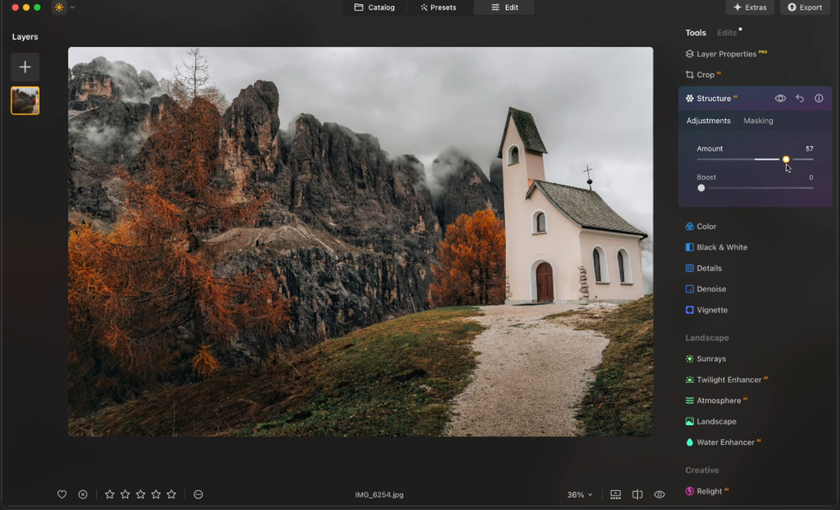 Luminar Neo is a relatively new photo-editing software, initially released in 2022, to be a modern alternative to Adobe Photoshop. Although it goes without saying that Luminar Neo will never be as powerful and deep as Photoshop, there are still some cases when it could be the more optimal option.
Luminar Neo is a relatively new photo-editing software, initially released in 2022, to be a modern alternative to Adobe Photoshop. Although it goes without saying that Luminar Neo will never be as powerful and deep as Photoshop, there are still some cases when it could be the more optimal option.
As an example, when you are a beginner, Luminar Neo would be a good place to start. I have been using it myself and then shifted to Photoshop. It is more user-friendly and can be used by those users who do not require a more professional-grade tool.
The other notable strength is the price. Luminar Neo is cheaper than Adobe Photoshop using a subscription model, but at the cost of fewer features.
Final Verdict: Is Adobe Photoshop Still the Best?
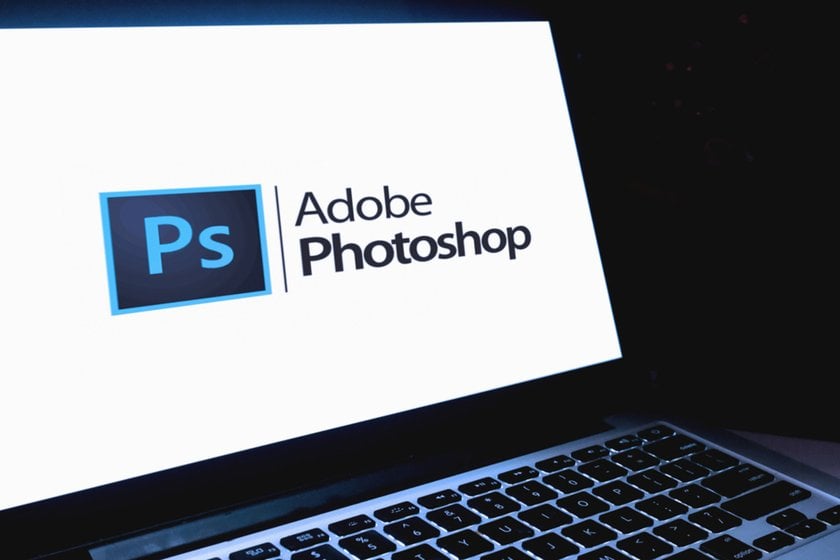 So, what is the main focus of this Adobe Photoshop review? Is Adobe Photoshop worth trying? Absolutely. If you aim to become a professional photographer, you will undoubtedly need to learn it eventually. However, if you are a beginner, starting with Luminar Neo is a wise choice. Its simpler interface and focused set of tools will help you learn the fundamentals of image manipulation without feeling overwhelmed.
So, what is the main focus of this Adobe Photoshop review? Is Adobe Photoshop worth trying? Absolutely. If you aim to become a professional photographer, you will undoubtedly need to learn it eventually. However, if you are a beginner, starting with Luminar Neo is a wise choice. Its simpler interface and focused set of tools will help you learn the fundamentals of image manipulation without feeling overwhelmed.
FAQ
How does Adobe Photoshop compare to other photo editors?
Compared to most other photo editing programs like Luminar Neo, GIMP, and Photopea, Adobe Photoshop is more expensive, but it also offers the most extensive functionality. If your goal is to become a professional photographer, learning Photoshop is essential.
What are the latest features in Adobe Photoshop?
The latest version of Adobe Photoshop was released in September 2025 and includes several powerful new features. You can now generate images using Adobe Firefly directly within the application and immediately begin editing them in Photoshop, and it's easier to organize your workflow, group images created across Adobe apps (like Photoshop, Illustrator, and Adobe Express).
How much does Adobe Photoshop cost?
The cheapest programs from Adobe Photoshop are InCony (it allows you to make text edits and layouts) and AI Assistant. Both cost $4.99 per month. The most expensive Photoshop plan is a Firefly Premium. It costs $199.99 per month, which is more expensive than the Creative Cloud Pro plan at $69.99. However, Creative Cloud Pro includes over 20 apps, including Photoshop, Illustrator, Firefly Standard, and enough disk space to save your photos. I choose Adobe Photoshop for editing photos and art. It is available on my laptop with Windows 11 software and my cell phone. I pay 22.99 dollars per month.
Is Adobe Photoshop good for beginners?
In short, no. Adobe Photoshop is packed with advanced features, making it the industry standard for professionals, but it can often be overwhelming for beginners. If you're just starting out, it's better to begin with a simpler image editing software like Luminar Neo.
What are the best alternatives to Adobe Photoshop?
While Adobe Photoshop remains the top choice for professional photographers, there are excellent free alternatives to Photoshop for those who need quicker or simpler edits.


